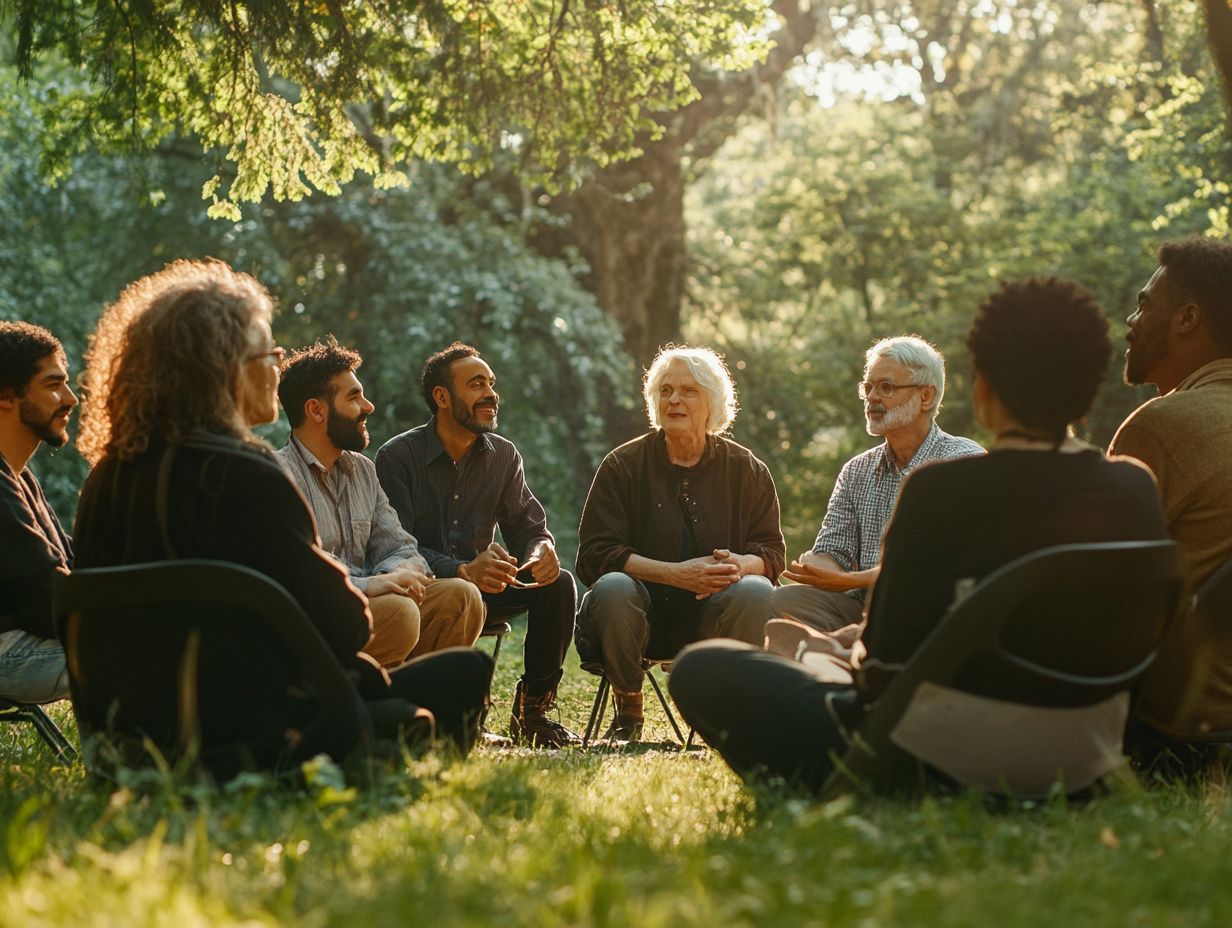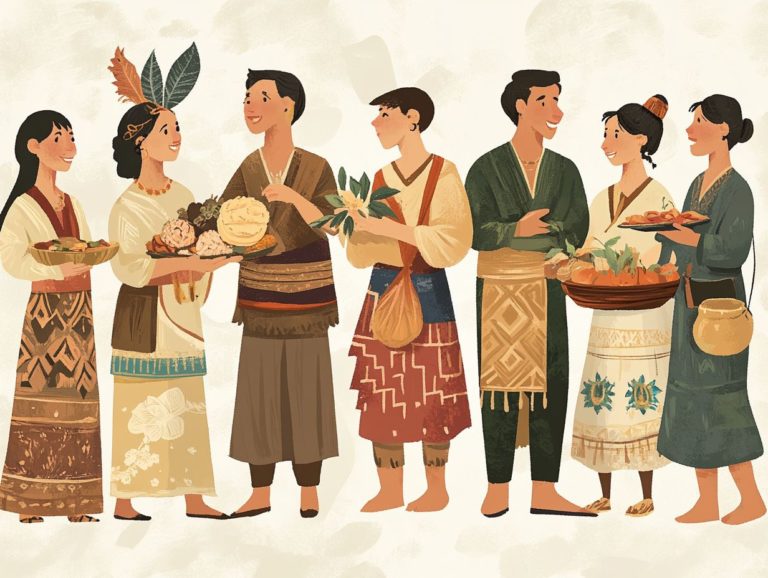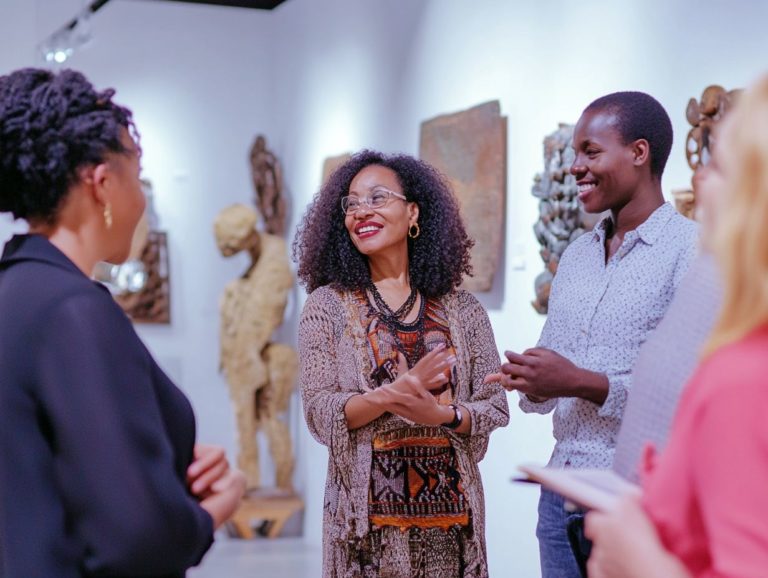The Importance of Open-Mindedness: A Key to Adjustment
Open-mindedness transcends being merely a buzzword; it embodies a crucial quality that nurtures personal development and enhances relationships.
This article delves into the essence of open-mindedness, outlining its defining traits and the significant advantages it offers, particularly in adapting to new circumstances and cultures.
You ll uncover practical strategies for nurturing this indispensable quality while confronting the biases that may obstruct your progress. By the end, you’ll realize how embracing open-mindedness has the potential to transform your life in remarkable ways.
Contents
- Key Takeaways:
- Understanding Open-Mindedness
- The Benefits of Being Open-Minded
- The Role of Open-Mindedness in Adjustment
- Practicing Open-Mindedness
- Overcoming Barriers to Open-Mindedness
- Frequently Asked Questions
- What is the significance of open-mindedness in adjustment?
- How does being open-minded affect one’s ability to adjust?
- Why is open-mindedness a key to successful adjustment?
- Is open-mindedness a trait that can be developed?
- What are some ways to cultivate open-mindedness for better adjustment?
- Can open-mindedness have a positive impact on relationships?
Key Takeaways:

- Open-mindedness is the willingness to consider new perspectives and ideas and is key to personal growth and improved relationships.
- Being open-minded helps us adapt to new situations and cultures, making it a crucial skill for adjusting to change.
- To cultivate open-mindedness, we can practice active listening, challenge our biases, and be open to learning from others.
Understanding Open-Mindedness
Open-mindedness is a rich psychological perspective that invites you to embrace new ideas and diverse experiences, all while actively engaging with various beliefs and viewpoints.
In contrast, close-mindedness can trap you in a conflict between your beliefs. By cultivating empathy and humility, you can significantly enhance your ability for personal growth and deepen your understanding within your community.
Definition and Characteristics
The hallmark of open-mindedness is your willingness to embrace diverse perspectives and engage in talking with others, even when faced with conflict between your beliefs.
This trait creates space for thoughtful discussions. It also helps you appreciate different viewpoints.
When you embody open-mindedness, you actively seek out conflicts in your beliefs, not as a means to defend your position but to deepen your understanding. You often exhibit key characteristics such as a strong capacity for empathy, allowing you to connect with others’ experiences, alongside a genuine respect for varying opinions that fosters constructive discussions.
Engaging in thoughtful conversations with an open heart can transform your relationships, ignite innovation, and lead to mutual growth.
The Benefits of Being Open-Minded
Embracing an open-minded approach brings a wealth of advantages, such as fostering personal growth, enriching relationships, and expanding your capacity for empathy.
These qualities significantly enhance your ability to engage in collaborative problem-solving, particularly in community service and cultural exchange initiatives.
Improved Relationships and Personal Growth

Open-mindedness plays a crucial role in enhancing your relationships by promoting respectful communication and understanding, both of which are vital for your personal growth.
When you approach conversations with an openness to diverse perspectives, you not only strengthen your connections with others but also foster an environment where empathy can truly flourish. This mindset encourages meaningful discussions, allowing everyone involved to share their views without the fear of being judged.
By actively engaging in respectful dialogue, you gain a richer appreciation for the complexities of different experiences, which in turn enhances your emotional intelligence.
As your relationships deepen through this collaborative exchange of ideas, you may find yourself evolving and discovering new insights that contribute significantly to your personal development.
The Role of Open-Mindedness in Adjustment
Open-mindedness is essential for adjustment, especially when navigating new situations and cultures! It gives you the power to embrace cultural exchange and actively engage in problem-based learning, fostering a deeper understanding and appreciation of diverse perspectives.
In conclusion, embracing open-mindedness is vital for personal growth and enriching relationships. Reflecting on your own experiences can help you cultivate this transformative quality!
Adapting to New Situations and Cultures
Adapting to new situations and cultures becomes much easier when you embrace open-mindedness. This remarkable trait gives you the power to respond positively and fully engage in cultural exchanges.
By being open-minded, you cultivate a willingness to explore diverse perspectives while simultaneously building emotional resilience. When confronted with unfamiliar beliefs and practices, your personal development journey deepens as you absorb and integrate various viewpoints.
As you navigate these new environments, emotions like curiosity and empathy can flourish. This fosters deeper connections with those around you.
Your ability to appreciate cultural nuances not only enriches your social interactions but also fosters a sense of belonging. Ultimately, this transformative process reshapes how you perceive yourself and your role within the intricate tapestry of human experience.
Practicing Open-Mindedness
Practicing open-mindedness entails a variety of strategies and techniques. Engage in self-reflection activities, which allow you to examine your thoughts and beliefs more deeply.
Cultivating critical thinking skills is vital. This enables you to assess information and perspectives with clarity. Embrace humility by actively seeking feedback from others, inviting new insights and fostering growth.
Tips for Cultivating Open-Mindedness

To cultivate open-mindedness, immerse yourself in self-reflection, ask probing questions, and engage in discussions that challenge your comfortable perspectives all while steering clear of confirmation bias.
This journey toward a more open mind starts with the practice of self-reflection. Critically examine your beliefs and assumptions, setting aside time to ponder your views for deeper insights and growth.
Asking thought-provoking questions sparks personal insight and nurtures your curiosity about differing opinions. Engage in meaningful dialogues with others especially those who hold contrasting views to dismantle entrenched ideas, opening pathways to greater understanding and empathy.
Embrace these strategies to nurture a mindset that welcomes diverse thoughts and promotes continuous learning and personal evolution.
Overcoming Barriers to Open-Mindedness
Overcoming barriers to open-mindedness, such as biases, closed-mindedness, and cognitive dissonance the mental discomfort experienced when holding two conflicting beliefs is crucial for cultivating a more inclusive mindset and promoting personal growth.
By addressing these challenges, create a space for deeper understanding and richer connections with others.
Addressing Biases and Closed-Mindedness
Addressing biases and closed-mindedness requires you to recognize the cognitive factors that shape your perspectives. Actively engage with others to foster open dialogue.
Use strategies like active listening and questioning your assumptions to create an environment that welcomes diverse thoughts. Engaging in discussions that present various viewpoints sharpens your critical thinking skills and nurtures empathy and understanding.
Collaborative learning experiences, whether in educational settings or community forums, promote these essential values. Seek literature that challenges your preconceived notions to foster personal reflection and growth, helping you dismantle the barriers that often lead to misunderstandings and divisions.
Frequently Asked Questions
What is the significance of open-mindedness in adjustment?

Open-mindedness is crucial in the process of adjustment. It allows individuals to be receptive to new ideas, perspectives, and experiences. This helps them adapt to unfamiliar situations and cope with change more effectively.
How does being open-minded affect one’s ability to adjust?
Being open-minded helps individuals release fixed ideas and biases. This makes it easier to accept and embrace new environments, cultures, and people.
Why is open-mindedness a key to successful adjustment?
Open-mindedness opens doors to new perspectives! It allows individuals to consider different solutions, making it easier to overcome challenges.
It also helps people learn and grow, enhancing their adaptability in the long run.
Is open-mindedness a trait that can be developed?
Yes! Open-mindedness is a skill that can be practiced and developed over time. It involves seeking new perspectives and challenging your beliefs.
What are some ways to cultivate open-mindedness for better adjustment?
Try actively listening to others and being open to feedback. Expose yourself to diverse cultures and experiences to enhance your growth.
Approach situations with a curious and non-judgmental mindset for a better understanding.
Can open-mindedness have a positive impact on relationships?
Absolutely! Open-mindedness fosters better communication and understanding. It helps you see things from your partner’s perspective, leading to more fulfilling relationships.





